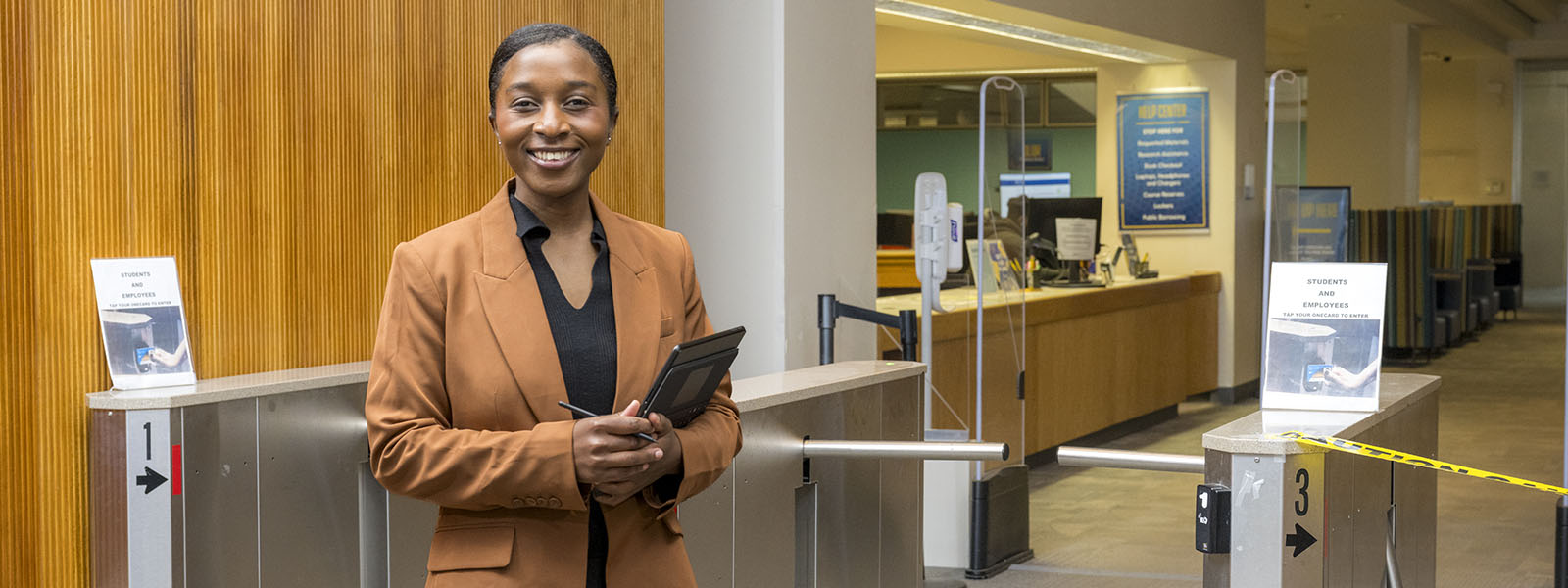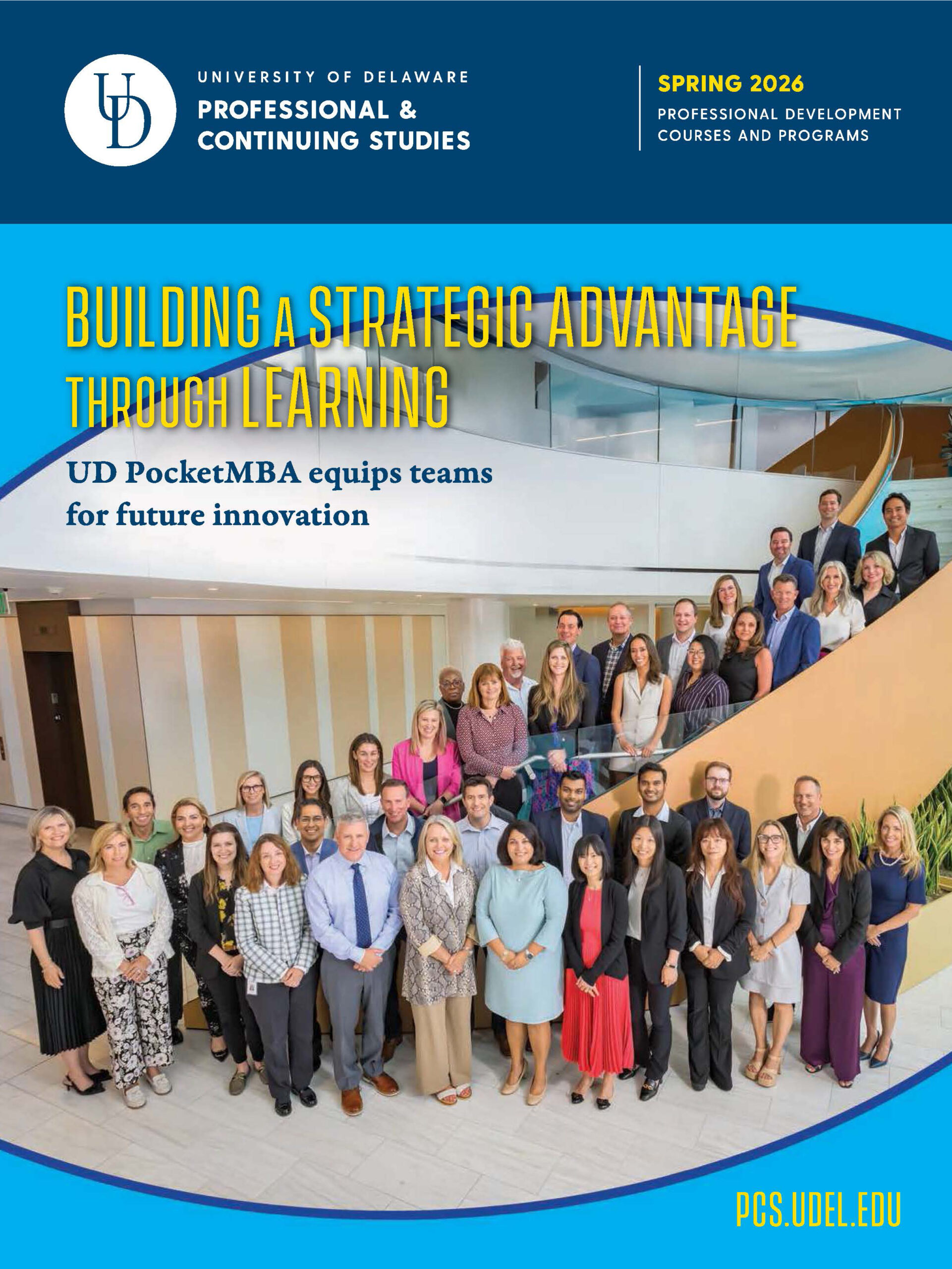
Learn project management best practices and theories
Next program starts February 4

- Understand the roles and functions of the project manager
- Explore best practices in predictive (Waterfall), adaptive (Agile) and Hybrid project methods
- Take the first step to attaining the Project Management Institute’s (PMI®) Project Management Professional (PMP®) designation
- Agile Simulation Game: online simulation game that will challenge your skills as a Scrum Master
- 10-week live-online, instructor-led course — February 4-April 8, 2026
- Discounts, payment plan, scholarships available
Successful companies and organizations in all fields use project management to achieve breakthrough results. The powerful and versatile tools of project management are transferable to any work environment and can be used to manage any project. Participants in this course learn by applying these tools and experiencing both the art and science of managing a successful project through the project life cycle.
Whether you are new to the project management discipline or looking to formalize your project management experience, this course provides current foundational knowledge to boost your project management skills. Participants will define a project and explore best practices in predictive (Waterfall), adaptive (Agile) and Hybrid project methods, applying the tools required for successful project delivery. Students acquire a set of functional tools and techniques that can immediately be applied in the workplace.
This course provides current foundational knowledge and offers an opportunity to earn the professional development units (PDUs) required by the Project Management Institute (PMI®) to maintain certifications or earn the contact hours needed to apply for a certification exam. The curriculum is aligned with the current PMP® exam content outline and applies principles from the PMBOK® (A Guide to the Project Management Body of Knowledge®) and the PMI® Agile Practice Guide, as well as references from other leading publications. This is a foundational program that teaches how to practice successful project management using PMI® best practices. This is not an official PMP® exam preparation course. An exam preparation courses does not cover foundational techniques. Exam prep assumes you are a practitioner with at least three years of project leadership and experience applying the foundational tools taught in this program.
 UD PCS Project Management program led by industry expert
UD PCS Project Management program led by industry expert
Ryan Crawford is corporate director of ChristianaCare’s Enterprise Portfolio Management Office, and his passion for delivering value is what brought him to teaching project management. “I love my profession and I want to give back to it,” he said. “Too many people have had bad experiences with project management because it’s often confused with administrative tasks or tools — projects should not be led like that.” >> READ THE ARTICLE
 Project Management Certificate course has real-world impact
Project Management Certificate course has real-world impact
When UD alumnus Jeffrey Martindale became the chief procurement and projects officer for the city of Newark, he turned to UD to find the project management training he needed to handle his diverse portfolio of responsibilities. He credits instructor Ryan Crawford with providing a fantastic explanation of a variety of tools that he was able to use quickly on the job for the benefit of Newark. >> READ THE ARTICLE
 Friends take Project Management Certificate course together
Friends take Project Management Certificate course together
“I had not been in a college class in many years, so the thought of going back to school was a bit intimidating to me,” said one prospective project management student. She reached out to her friend and former coworker to see if she would be interested in taking the class with her. The two became informal accountability partners and provided mutual support by participating in the Project Management Certificate program together. >> READ THE ARTICLE
Check out our online project management Self-Paced Programs, which include a large selection of Agile, exam prep and strategy, Microsoft® Project, and PDU bundle classes. — LEARN MORE
REGISTRATION AND SCHEDULE
|
PROGRAM DETAILS
Who should participate in this program?
- Newly appointed or aspiring project managers
- Experienced project leaders who want to take their management skills to the next level
- Managers who want to apply the discipline of project management to make their organizations more effective and more competitive
- Business and management professionals who want to enhance their planning and resource management knowledge
- Project managers seeking an entry into the Project Management Institute’s PMP® (Project Management Professional) certification process
Instructor
Ryan J. Crawford is the corporate director of the Enterprise Portfolio Management Office (EPMO) at ChristianaCare. Crawford brings nearly 20 years of extensive PMO development, portfolio management, and program and project management experience in the financial, technology and healthcare industries. He prides himself on bringing the human element to projects and is a people-first leader. His core philosophy on project management is that projects exist to deliver value and keeping value at the center of all facets of project management leads to optimal outcomes.
Crawford’s certifications include the Project Management Professional (PMP®) through the Project Management Institute (PMI®) and Change Management Practitioner through Prosci. In addition to holding multiple graduate certificates from Cornell University, he earned his master of science with a concentration in finance from the University of Florida and his bachelor of science in business administration with a double major in finance and economics from the University of Delaware. Crawford serves on the board of directors for the Boys & Girls Clubs of Delaware and is a mentor through PMI®.
Course outline
Module 1: Project Management Framework and Planning - Weeks 1-5
This module provides an introduction to project management concepts and the terminology commonly encountered in the world of project management. Further, it describes the constraints and benefits of project management and then presents an overview of project management standards and related disciplines.
Students will select a problem or opportunity that needs to be solved through a ranking process. Project selections will feed the formation of project teams. Each team will compose a team charter to define how it will govern itself throughout the program.
Topics include:
- Introductions and Course Overview
- Project Management Foundational Elements
- Project Life Cycles - Agile (Adaptive), Waterfall (Predictive), Hybrid
- Project Portfolio Management and PMO Concepts
- Team Charter
- Defining Organizations and Matrixes
- Introduction To Agile Concepts
- Project Selection and Initiation
Project teams initiate a project by completing a business case and a project charter. After completing the project charter, the project teams identify project stakeholders and develop a stakeholder register. The project teams begin the process of planning a project in earnest by conducting a risk analysis, creating a communication plan, developing a work breakdown structure and defining the required tasks. Students then estimate the duration and work for all tasks in the project.
Topics include:
- Initiating A Project
- Project Mission and SMART Goals
- Leadership, Motivation and Managing Expectations
- Defining Roles and Responsibilities
- Defining, Gathering and Prioritizing Requirements
- Business Case Basics
- Project Charter: Why Your Project Needs One
- Stakeholder Identification and Engagement
- Developing A Project Management Plan
- Defining the Scope
- Create a Communication Plan
- Project Status Meetings and Reports
Module 2: Scheduling, Execution and Closing - Weeks 6-10
This module includes planning the work involved in the project and determining the schedule for Agile, Waterfall and Hybrid projects. After finalizing the project plan, the project baseline is set against which progress is tracked and performance is measured so that corrective action can be taken when necessary to meet project objectives. Students will hold project status meetings, manage project changes and variances, and motivate and manage project resources.
Topics include:
- Identifying and Assessing Project Risk
- Change Management
- Developing the Work Breakdown Structure
- Activities and Sequencing
- Estimating Duration
- Creating Task Dependencies
- Building an Executable Schedule
- Reporting Progress Against the Project Plan: Earned Value Analysis
- Agile Simulation Game: Test Your Skills as a Scrum Master
Closing a project formalizes acceptance of the product, service or result and brings the project or a project phase to an orderly end. As the final requirement for completion of the certificate, students present their capstone project and share lessons learned.
Topics include:
- Quality Management
- Lessons Learned
- Closing a Project
- Archiving Historical Information
- Capstone Presentations
Grading policy — To earn the Project Management Certificate, students must complete each module with a passing grade and earn a “C” or above as the course grade.
Learner outcomes
Upon completion of this course, participants will be able to:
- Understand the role and functions of the project manager and Scrum Master.
- Plan and manage projects using tools such as Work Breakdown Structures, Gantt charts and Agile ceremonies.
- Manage your time, budget and project team more effectively.
- Apply these tools immediately by completing a project plan and budget as part of the course of study.
- Acquire practical, use-it-next-day skills to manage any project, large or small.
- Gain hands-on experience using powerful, versatile tools to keep projects on track, on time and on budget.
- Complete the required project management education hours toward a Project Management Institute (PMI®) certification.
- Earn PDUs (Professional Development Units) for recertification purpose through the Project Management Institute (PMI®).
Career resources to help you succeed
NEW! — Participants enrolled in this certificate program will have access to a new suite of career resources and services to help them navigate a career transition, maximize their job search efforts and more. Click here to learn more about UD PCS Career Services.
About PMP® and PMI®
The Project Management Professional (PMP®) credential is the most important industry-recognized certification for project managers. Globally recognized and demanded, the PMP® demonstrates one has the experience, education and competency to lead and direct projects. The PMP® credential is offered through the Project Management Institute (PMI®). This program is an excellent starting place to attain the Project Management Institute’s (PMI®) Project Management Professional (PMP®) designation, which remains the global standard for professional project managers.
The Project Management Institute was the first organization to offer a credential specifically for project managers, and continues to be one of the world’s largest professional membership associations. With half a million members and credential holders in more than 185 countries, it seeks to advance the project management profession through globally recognized standards and certifications, collaborative communities, an extensive research program, and professional development opportunities.
Technology requirements
A laptop or desktop computer (PC or Mac) is required to participate in this class.
Prerequisites
- There are no academic prerequisites for this program. Project managers can come from virtually any educational or experience background.
- Project managers have to be able to understand and communicate both the technical and business cases for a project.
- Access to a computer (PC or MAC) with internet access is required for this course. A laptop is preferred.
What our students say
- “It was the most eclectic collection of students I’ve ever seen, which was great because we had a lot of diversity in terms of goals, work experience and professional backgrounds.” - Tom Nesterak
- "Since completing the program, I have moved into a new role managing large scale global projects." - Shams Naim
- "This course introduced me to Microsoft Project, which I find to be a very useful tool."
- Ginny Kucharski - "I pursued the Project Management Certificate in order to increase my value as an employee with my company." - Randy Huber


